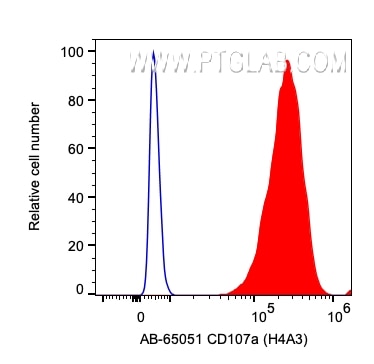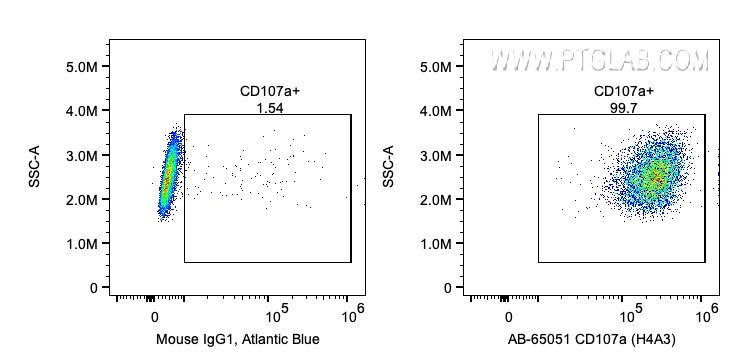CD107a / LAMP1 Monoklonaler Antikörper
CD107a / LAMP1 Monoklonal Antikörper für FC (Intra)
Wirt / Isotyp
Maus / IgG1, kappa
Getestete Reaktivität
human
Anwendung
FC (Intra)
Konjugation
Atlantic Blue™ Fluorescent Dye
CloneNo.
H4A3
Kat-Nr. : AB-65051
Synonyme
Galerie der Validierungsdaten
Geprüfte Anwendungen
| Erfolgreiche Detektion in FC | HeLa-Zellen |
Empfohlene Verdünnung
| Anwendung | Verdünnung |
|---|---|
| This reagent has been pre-titrated and tested for flow cytometric analysis. The suggested use of this reagent is 5 μl per 10^6 cells in a 100 µl suspension or 5 μl per 100 µl of whole blood. | |
| Sample-dependent, check data in validation data gallery | |
Produktinformation
AB-65051 bindet in FC (Intra) CD107a / LAMP1 und zeigt Reaktivität mit human
| Getestete Reaktivität | human |
| Wirt / Isotyp | Maus / IgG1, kappa |
| Klonalität | Monoklonal |
| Typ | Antikörper |
| Immunogen | Humane adhärente periphere Blutzellen |
| Vollständiger Name | lysosomal-associated membrane protein 1 |
| GenBank-Zugangsnummer | BC006345 |
| Gene symbol | LAMP1 |
| Gene ID (NCBI) | 3916 |
| Konjugation | Atlantic Blue™ Fluorescent Dye |
| Excitation/Emission maxima wavelengths | 404 nm / 458 nm |
| Form | Liquid |
| Reinigungsmethode | Protein-G-Reinigung |
| Lagerungspuffer | PBS with 0.09% sodium azide and 0.5% BSA. |
| Lagerungsbedingungen | Store at 2-8°C. Avoid exposure to light. Stable for one year after shipment. |
Hintergrundinformationen
LAMP1 (CD107a) is a heavily glycosylated membrane protein enriched in the lysosomal membrane. LAMP1 is extensively glycosylated with asparagine-linked oligosaccharides which protect it from intracellular proteolysis (PMID: 10521503). Although LAMP1 is expressed largely in the endosome-lysosomal membrane of cells, it is also found on the plasma membrane (PMID: 16168398). Elevated LAMP1 expression at the cell surface has also been detected during platelet and granulocytic cell activation, as well as in some tumor cells (PMID: 29085473). LAMP1 functions to provide selectins with carbohydrate ligands. This protein has also been shown to be a marker of degranulation on lymphocytes such as CD8+ and NK cells and may also play a role in tumor cell differentiation and metastasis (PMID: 18835598; 29085473; 9426697).



